As the terrorist threat continues to evolve in North Africa and sub-Saharan Africa, the Africa Center through its various programs continues to bring together African, American and European civilian and military professionals to discuss its dimensions and possible solutions.
Countering violent extremism
On February 24–27, 2014, the Africa Center convened African Union (AU), United States government and African partners in Addis Ababa, Ethiopia, to examine terrorist use of communications. The meeting brought together civilian and military officials from approximately a dozen countries from the Horn of Africa and the Middle East.
Dr. Benjamin Nickels, the Assistant Professor and Chair, Transnational Threats and Counterterrorism provided a four-point framework for developing effective counter-messaging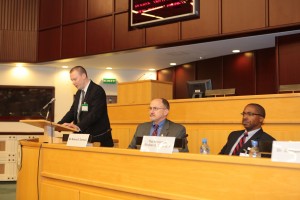 : 1) identify who is susceptible to terrorist recruitment; 2) identify the most pressing concerns that violent extremists exploit; 3) identify which populations, areas and institutions are most vulnerable to extremists; and 4) identify trend-lines to distinguish between individual, community and societal needs.
: 1) identify who is susceptible to terrorist recruitment; 2) identify the most pressing concerns that violent extremists exploit; 3) identify which populations, areas and institutions are most vulnerable to extremists; and 4) identify trend-lines to distinguish between individual, community and societal needs.
“Radicalization is a process that begins with some form of alienation,” Dr. Nickels explained. “It also involves intermediaries working on many different levels and employing different platforms including social media. … What is required is a comprehensive approach based on in-depth research because there is no single profile; profiles shift over time and they are becoming increasingly diverse in the African context,” he noted.
In the question-and-answer session, financial incentives, economic and societal cleavages, ideological, political and religious convictions, and coercion were all identified as push factors for recruitment. The pull factors identified were social networks and groups, religious and cultural organizations, criminal groups, social media and the internet.
Dr. Nickels identified four issues for policy consideration: 1) Individual motivations for joining terrorist organizations vary significantly. 2) The role of perceptions in radicalization and recruitment makes strategic communication central to counterterrorism initiatives. 3) The reasons individuals join terrorist organizations are not always the same as why they choose to remain in these groups. 4) Poverty is not necessarily a root cause of terrorism.
Participants worked in small groups for the duration of the meeting. There was a recognition that governments needed to be attentive to their own reputation by ensuring good governance, transparency and inclusion in order to solicit support from their populations to counter violent extremists.
“The state, in making demands on its citizens to counter extremist messages needs credibility and legitimacy; therefore genuine democratization cannot be delinked from larger counter terrorism efforts,” Kate Almquist Knopf, then an ACSS Adjunct Faculty member and now director of the Africa Center, stressed.
Six recommendations were put forward:
- Develop capacity to monitor, examine and analyze violent extremist messaging.
- Address the issues of citizenship, national unity and national identity.
- Design and implement a mix of interventions targeting vulnerable populations.
- Support positive and credible voices.
- Develop a media and communications framework.
- Create trust between civil society and the state.
Ms. Caroline Njuki, a Project Manager at the Intergovernmental Authority on Development (IGAD) suggested that counterstrategies needed to incorporate “face-to-face messaging” in addition to more traditional messaging platforms.
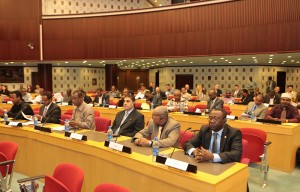 Governments, religious leaders, civil society activists and opinion leaders need to work together to construct counter narratives and deconstruct negative messages. Ms. Njuki called on governmental and non-governmental partners to establish networks, develop simple and concise messages, study and exploit the weak points of extremist messages and communicate government effectiveness in improving service delivery and meeting citizens’ needs.
Governments, religious leaders, civil society activists and opinion leaders need to work together to construct counter narratives and deconstruct negative messages. Ms. Njuki called on governmental and non-governmental partners to establish networks, develop simple and concise messages, study and exploit the weak points of extremist messages and communicate government effectiveness in improving service delivery and meeting citizens’ needs.
Ms. Almquist Knopf discussed the challenges of the international policymaking process. She urged participants first to recognize that they were the international community and therefore needed to take responsibilities to take the recommendations forward to their respective governments. Second, she urged partners to be modest in their expectations of what could be realized from processes of international negotiation. Third, she reminded participants that there was an international architecture for counterterrorism—the Global Counterterrorism Forum—an informal multilateral platform focusing on identifying critical civilian counterterrorism needs and mobilizing the necessary expertize to address such needs.
Ms. Almquist Knopf also pointed out that a global fund for countering violent extremism was in the process of being established through public-private partnerships.
She urged African countries to tap these mechanisms and continually inform themselves of what was happening at the international level.
“We need to be comprehensive, collaborative and focused,” she said. “International bodies can offer broad frameworks and strategies but the solutions need to be African-owned.”
The growing Boko Haram threat
On December 18, 2013, one month after the U.S. designated Boko Haram and Ansaru as terrorist organizations, the Africa Center hosted a roundtable at National Defense University in Washington, D.C., titled “Understanding and Mitigating the Drivers of Islamist Extremism in Northern Nigeria.” It brought together leaders, subject matter experts, military officers and civilian counterparts from the senior colleges at NDU.
Dr. John Paden, a Clarence Robinson Professor in Public and International Affairs at George Mason University argued that Nigeria’s lack of a truly national identity lies at the root of violent conflicts in the country and support the growth of terrorist organizations such as Boko Haram. “Nigeria’s politics reflect deep socio-economic cleavages between the north and south,” he argued. “These dichotomies shape the political process and lend themselves to exploitation by politicians, military leaders and terrorist groups including Boko Haram.”
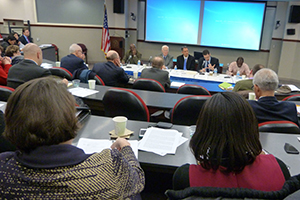 “The issue of identity is key to understanding conflicts in Northern Nigeria,” Mr. Michael Olufemi Sodipo said. “Rather than thinking about what you can do for—or with—them, most people care most about who you are and where you come from.” The organization Mr. Sodipo founded, the Peace Initiative Network in Kano, Nigeria, is working with young leaders to engender tolerance, citizenship and good leadership. “I saw people without skills and hope, full of anger and ready to kill because of faith,” he explained. “That created the idea of creating an organization that could help bridge the divides and today the Peace Initiative Network is working with young people in four states—Kano, Gombe, Plateau and Delta—to help them realize their potential and contribute positively to their communities.”
“The issue of identity is key to understanding conflicts in Northern Nigeria,” Mr. Michael Olufemi Sodipo said. “Rather than thinking about what you can do for—or with—them, most people care most about who you are and where you come from.” The organization Mr. Sodipo founded, the Peace Initiative Network in Kano, Nigeria, is working with young leaders to engender tolerance, citizenship and good leadership. “I saw people without skills and hope, full of anger and ready to kill because of faith,” he explained. “That created the idea of creating an organization that could help bridge the divides and today the Peace Initiative Network is working with young people in four states—Kano, Gombe, Plateau and Delta—to help them realize their potential and contribute positively to their communities.”
Dr. Ousman Kobo, an Associate Professor of History at Ohio State University stressed the importance of strategic messaging to counter the Boko Haram narrative. “Boko Haram’s leader, Mohammed Yusufu, has created a powerful narrative based on rejecting Western education, and creating an alternative polity without social grievances, income inequalities, poverty and corrupt practices to rally the population to its cause,” he explained. “Defeating this terrorist group therefore requires government, civil society and international partners to work together to understand the roots of Boko Haram’s message and develop appropriate countermeasures.”
Explaining the roots of militancy
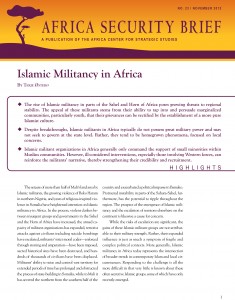 On November 23, 2012, the Africa Center published an Africa Security Brief titled “Islamic Militancy in Africa.” The brief, written by Dr. Terje Østebø, an Assistant Professor at the Center for African Studies and the Department of Religion at the University of Florida, makes three conclusions: 1) The appeal of terrorist organizations in parts of the Sahel and the Horn of Africa stems from their ability to tap into and persuade marginalized communities, particularly youth, that their grievances can be rectified by the establishment of a more pure Islamic culture. 2) Despite breakthroughs, Islamic militants in Africa typically do not possess great military power and may not seek to govern at the state level; rather, they tend to be homegrown phenomena focused on local concerns. 3) Islamic militant organizations in Africa generally only command the support of small minorities within Muslim communities; however, ill-considered interventions, especially those involving Western forces, can reinforce the militants’ narrative, thereby strengthening their credibility and increasing recruitment.
On November 23, 2012, the Africa Center published an Africa Security Brief titled “Islamic Militancy in Africa.” The brief, written by Dr. Terje Østebø, an Assistant Professor at the Center for African Studies and the Department of Religion at the University of Florida, makes three conclusions: 1) The appeal of terrorist organizations in parts of the Sahel and the Horn of Africa stems from their ability to tap into and persuade marginalized communities, particularly youth, that their grievances can be rectified by the establishment of a more pure Islamic culture. 2) Despite breakthroughs, Islamic militants in Africa typically do not possess great military power and may not seek to govern at the state level; rather, they tend to be homegrown phenomena focused on local concerns. 3) Islamic militant organizations in Africa generally only command the support of small minorities within Muslim communities; however, ill-considered interventions, especially those involving Western forces, can reinforce the militants’ narrative, thereby strengthening their credibility and increasing recruitment.
Dr. Østebø also cautions that the gains of groups like al-Shabaab and Boko Haram are not attributable to military strength, but rather their influence is just as much a symptom of fragile and complex political contexts.
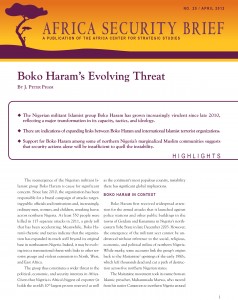 Dr. Peter J Pham, the Director of the Michael S. Ansari Africa Center at the Atlantic Council in Washington, DC, raises similar issues in an African Security Brief titled “Boko Haram’s Evolving Threat.” He concludes that support for Boko Haram among some of northern Nigeria’s marginalized Muslim communities suggests that security actions alone will be insufficient to quell the instability. Dr. Pham offers the following policy recommendations: 1) invest in better information and analysis; 2) reinforce counterterrorism operations with strategic communications and messaging at all levels, 3) address legitimate grievances, 4) prioritize specialized training for Nigerian security forces, and 5) strengthen regional cooperation and capacity building in Nigeria and neighboring countries.
Dr. Peter J Pham, the Director of the Michael S. Ansari Africa Center at the Atlantic Council in Washington, DC, raises similar issues in an African Security Brief titled “Boko Haram’s Evolving Threat.” He concludes that support for Boko Haram among some of northern Nigeria’s marginalized Muslim communities suggests that security actions alone will be insufficient to quell the instability. Dr. Pham offers the following policy recommendations: 1) invest in better information and analysis; 2) reinforce counterterrorism operations with strategic communications and messaging at all levels, 3) address legitimate grievances, 4) prioritize specialized training for Nigerian security forces, and 5) strengthen regional cooperation and capacity building in Nigeria and neighboring countries.
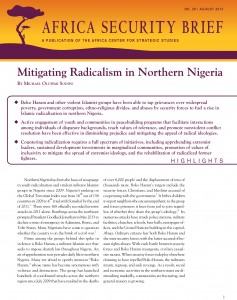 Similar themes are discussed in the August 26, 2013, Africa Security Brief titled “Mitigating Radicalism in Northern Nigeria.” The Founder of the Peace Initiative Network in Kano, Nigeria, Mr. Michael Olufemi Sodipo argues that the resonance of groups like Boko Haram and Ansaru has much to do with the relationship between youth unemployment, limited economic opportunities and the emergence of terrorism. Mr. Sodipo warns about the lack of a unifying national identity in Nigeria: “Mutual distrust and strong ethno-religious identities in both north and south prevented a truly pan-Nigerian identity from developing. … Nigerian politics were and remain characterized by a keen competition for socio-economic resources with the state seen as the main dispenser of these benefits,” he explains.
Similar themes are discussed in the August 26, 2013, Africa Security Brief titled “Mitigating Radicalism in Northern Nigeria.” The Founder of the Peace Initiative Network in Kano, Nigeria, Mr. Michael Olufemi Sodipo argues that the resonance of groups like Boko Haram and Ansaru has much to do with the relationship between youth unemployment, limited economic opportunities and the emergence of terrorism. Mr. Sodipo warns about the lack of a unifying national identity in Nigeria: “Mutual distrust and strong ethno-religious identities in both north and south prevented a truly pan-Nigerian identity from developing. … Nigerian politics were and remain characterized by a keen competition for socio-economic resources with the state seen as the main dispenser of these benefits,” he explains.
The nature of the African post-colonial state
Professor Hussein Solomon, a senior Professor in the Department of Political Science at the University of the Free State in Bloemfontein, South Africa, faults the weaknesses of the post-colonial African state for constraining African and international efforts to curb terrorism. “Not much policy attention has been given to the problems inherent in the structures and functions of the African post-colonial state,” he said in an April 4, 2013, Africa Center interview. “The fragility and the inherently corrupt nature of the African state provide fertile grounds for the growth of militant Islam. Islamists piggyback on existing social cleavages in society, such as ethnicity in Nigeria and Mali and clan identity in Somalia. The corrupt nature of the polity, on the other hand, provides them with the means to frustrate counterterrorism efforts through corrupt elements in the security forces,” he cautioned.
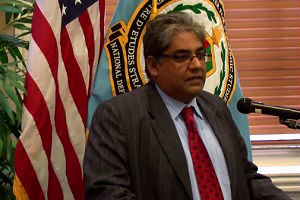 Professor Solomon made similar observations in a lecture at the National Defense University (NDU) titled “Linkages between Islamic Groups in Africa: The Case of Boko Haram,” hosted by the Africa Center. He urged African and U.S. partners to focus on creating inclusive societies and states which truly care about the welfare of citizens. “Often Islam is merely a vehicle for a number of grievances citizens have with their respective state,” he told participants.
Professor Solomon made similar observations in a lecture at the National Defense University (NDU) titled “Linkages between Islamic Groups in Africa: The Case of Boko Haram,” hosted by the Africa Center. He urged African and U.S. partners to focus on creating inclusive societies and states which truly care about the welfare of citizens. “Often Islam is merely a vehicle for a number of grievances citizens have with their respective state,” he told participants.
A new social contract needs to be established between the political leader and citizens, and African political elites thus far have resisted this; it is therefore imperative that the international community critically engages with these and compel them to reform in the interests of their citizens and in the interests of international security.”
Ethnicity and identity
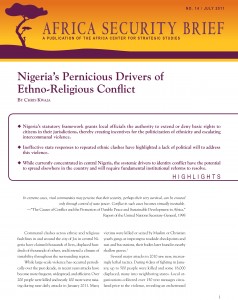 Chris Kwaja, a Lecturer and Researcher in the Center for Conflict Management at the University of Jos, Nigeria, discusses the intersection between ethnic identity and terrorism in a July 2011 Africa Security Brief, “Nigeria’s Pernicious Drivers of Ethno-Religious Conflict.” He provides four recommendations: 1) eliminate indigene/settler classifications in government decision making; 2) strengthen, coordinate, and deconflict security institutions; 3) make protection of minority rights a priority; and 4) establish community-based, state-supported peacebuilding committees.
Chris Kwaja, a Lecturer and Researcher in the Center for Conflict Management at the University of Jos, Nigeria, discusses the intersection between ethnic identity and terrorism in a July 2011 Africa Security Brief, “Nigeria’s Pernicious Drivers of Ethno-Religious Conflict.” He provides four recommendations: 1) eliminate indigene/settler classifications in government decision making; 2) strengthen, coordinate, and deconflict security institutions; 3) make protection of minority rights a priority; and 4) establish community-based, state-supported peacebuilding committees.
Similar analysis can be found in an April 4, 2010, Africa Security Brief, “Misinterpreting Ethnic Conflicts in Africa,” by Father Clement Mweyang Aapengnuo, then a Doctoral Student in the Institute for Conflict Analysis and Resolution at George Mason University.
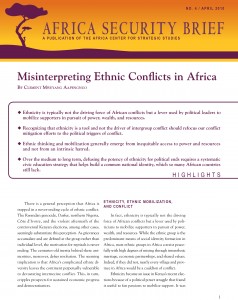 Dr. Aapengnuo makes four policy-relevant observations: First, ethnicity is typically not the driving force of African conflicts but a lever used by political leaders to mobilize supporters in pursuit of power, wealth and resources. Second, recognizing that ethnicity is a tool and not the driver of intergroup conflict should refocus conflict mitigation efforts to the political triggers of conflict. Third, ethnic thinking and mobilization generally emerge from inequitable access to power and resources and not from an intrinsic hatred. Fourth, over the medium to long term, defusing the potency of ethnicity for political ends requires a systematic civic education strategy that helps build a common national identity, which so many African countries still lack.
Dr. Aapengnuo makes four policy-relevant observations: First, ethnicity is typically not the driving force of African conflicts but a lever used by political leaders to mobilize supporters in pursuit of power, wealth and resources. Second, recognizing that ethnicity is a tool and not the driver of intergroup conflict should refocus conflict mitigation efforts to the political triggers of conflict. Third, ethnic thinking and mobilization generally emerge from inequitable access to power and resources and not from an intrinsic hatred. Fourth, over the medium to long term, defusing the potency of ethnicity for political ends requires a systematic civic education strategy that helps build a common national identity, which so many African countries still lack.
North Africa and the Sahel
There are parallels between the terrorism challenges faced in East Africa and those in other parts of the continent.
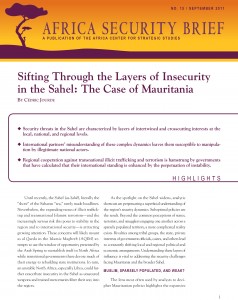 Cedric Jourde, an Associate Professor at the School of Political Studies, University of Ottawa, Canada, in a September 2011 Africa Security Brief titled “Sifting Through the Layers of Insecurity in the Sahel: The Case of Mauritania,” notes that security threats in the region are characterized by layers of intertwined and crosscutting issues at regional, national and local levels and that these dynamics are being manipulated by illicit actors.
Cedric Jourde, an Associate Professor at the School of Political Studies, University of Ottawa, Canada, in a September 2011 Africa Security Brief titled “Sifting Through the Layers of Insecurity in the Sahel: The Case of Mauritania,” notes that security threats in the region are characterized by layers of intertwined and crosscutting issues at regional, national and local levels and that these dynamics are being manipulated by illicit actors.
He explains that in Mauritania, like other African countries, allegiances to one’s ethnic group, tribe, clan or personal network can be stronger than those to the state and it is these allegiances that terrorists exploit to recruit followers. He urged African countries to focus on building stronger loyalties through genuine development and political outreach to marginalized communities and international partners to provide strong support to democratic regimes and those that are implementing democratic changes, while pressuring those that opt for authoritarian policies.
Dr. Noureddine Jebnoun, an ACSS faculty member focusing on North Africa and the Sahel, reaches similar conclusions in a journal article titled “Changing Security Dynamics in North Africa and Western Sahel Region,” recently published in the Portuguese Journal of International Affairs. He argues that governments in the region needed to urgently shift toward a citizen-centered approach to governance in order to strengthen the social contract, build more inclusive notions of citizenship and reduce social inequalities in order to increase resilience against terrorist recruitment.
* * *
Three core issues emerge from the Africa Center’s body of work on terrorism in Africa:
First, terrorism brings into sharper focus the need to address the social grievances and socio-economic inequalities that create violent conflict.
Second, terrorism in many cases is symptomatic of the fragile nature of the post-colonial African state.
Third, to be more effective, counterterrorism strategies need to integrate and coordinate all available instruments of national power—diplomatic, informational, military, political and economic—comprehensively and not rely on the application of coercive tools alone.
Sources
- Africa Center’s Dr. Jebnoun Highlights Key Security Issues in Sahel
- Africa Center Co-Hosts Countering Violent Extremist Messaging Workshop in Addis Ababa, Ethiopia
- Ask the Expert: Dr. Hussein Solomon on Radical Islamism in Africa
- Boko Haram Reveals Complex Divisions within Nigeria, Scholars Say at ACSS Roundtable
- Africa Security Brief #4: Misinterpreting Ethnic Conflicts in Africa
- Africa Security Brief #14: Nigeria’s Pernicious Drivers of Ethno-Religious Conflict
- Africa Security Brief #15: Sifting Through the Layers of Insecurity in the Sahel: The Case of Mauritania
- Africa Security Brief #20: Boko Haram’s Evolving Threat
- Africa Security Brief #23: Islamic Militancy in Africa
- Africa Security Brief #26: Mitigating Radicalism in Northern Nigeria
More on: Countering Violent Extremism Al Shabaab Boko Haram Ethnic Conflict Sahel

